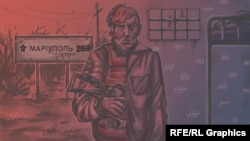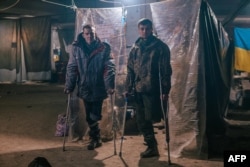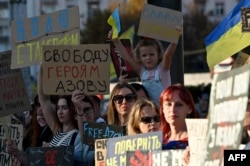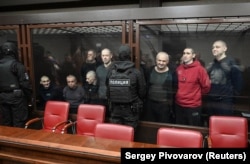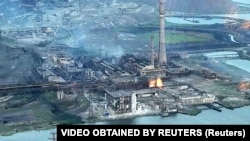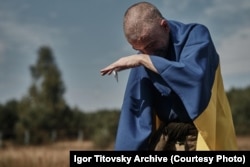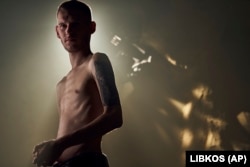On May 25, Russia and Ukraine completed the largest prisoner exchange since the start of Russia's full-scale invasion.
The deal brokered during renewed talks between Russian and Ukrainian delegations in Istanbul allowed thousands of people to return home.
But not a single one of them was from the Azov Brigade -- one of Ukraine's best-known and symbolic military units.
Hundreds of Azov fighters were captured during Russia's bloody siege of the Azov Sea city of Mariupol in 2022.
The battle was one of the war's most brutal, credited with giving Ukrainian forces vital time in the early months of the Russian full-scale invasion.
The Azov Brigade's heroic defense of Mariupol's last stronghold -- the Azovstal steel plant -- has drawn the ire of many Russian officials, who have designated the unit a terrorist organization and have called for its fighters to face tribunals and even execution.
Since then, Ukrainian society has rallied behind those captured. While some Mariupol defenders -- including Azov's commanders -- have been released from Russian captivity, hundreds more remain imprisoned under brutal conditions.
For years, Russian officials have seized on the origins of the Azov Brigade -- initially formed as a regiment in 2014 out of a right-wing militia -- distorting or exaggerating members' nationalist views and actions to support the false assertion that Ukraine is controlled or dominated by neo-Nazis.
Ukrainian authorities say Russia has consistently blocked efforts to return Azov fighters during negotiations.
Three years into the full-fledged war, some of brigade's most prominent military commanders -- along with the relatives of those still in captivity -- are no longer convinced that this is the only reason.
'Incompetence Or A Conscious Decision?'
Hours after Ukraine and Russia completed the last phase of exchanging 1,000 people on May 25, Denys Prokopenko, commander of the 12th Special Forces Brigade Azov, called the absence of Azov fighters a "disgrace to the entire state."
"This feels like a mockery," said Prokopenko, who lived through Russian captivity himself. He added that he didn't believe Russia was the only obstacle for the return of Azov fighters.
"If that were truly the case, neither I nor other Azov fighters would have returned from captivity," Prokopenko wrote on X.
Days after the third anniversary of Ukraine's withdrawal from the Azovstal plant, Prokopenko's post reinforced concerns among many ordinary Ukrainians about the fate of those who were taken prisoner at the time and who are still being held by Russia.
In response, Andriy Yusov, Ukraine's deputy head of the Coordination Headquarters for the Treatment of Prisoners of War, told RFE/RL's Ukrainian Service he would not be commenting on "emotional" statements as the topic of Azov fighters in Russian captivity is "sensitive and painful."
Yusov accused Russia of purposely complicating the exchange processes for Azov fighters to increase pressure on the Ukrainian government.
Criminal cases opened by Russian investigators against some Ukrainian POWs are an example of this, the coordination headquarters stated earlier.
"Our prisoners are in Putin's hands.... [Russian special services] exploit the prisoner issue for the purpose of warfare against Ukraine," Yusov said.
Prokopenko, however, said the problem also lies in Ukraine's strategy, urging changes in what he called a "mechanism that stopped working."
"We must find alternatives, offer them someone more valuable than a contracted soldier," he said. "Ukraine is packed with Russian agents; all our special services know this very well."
The Ukrainian authorities further clarified that the lists for the latest prisoner exchange were created separately by Ukraine and Russia and both countries have chosen POWs they want to free.
Svyatoslav Palamar, Azov's deputy commander, joined Prokopenko in questioning such an approach. Palamar said the exchange indeed "brought a lot of decent soldiers" home. But it also freed some who cooperated with Russian authorities, he added.
"[Is this] unwillingness, incompetence, or a conscious decision? Are we negotiating or just accepting what the enemy says?" Palamar wrote on his Facebook page.
In an interview with RFE/RL, Oleksandra Yefimenko, the communications manager for the Association of Relatives of Kremlin Political Prisoners, said she does not believe the Ukrainian authorities are deliberately not seeking the return of the Azov fighters.
However, along with the association's head, Ihor Kotelianets, Yefimenko urged officials to be more communicative and transparent on the matter.
"If there are no priority categories present in the exchange -- seriously ill, women, the elderly, or those imprisoned for a long time -- it creates deep distrust," Kotelianets wrote earlier on his Facebook page.
"We urge the Ukrainian president's office and the Coordination Headquarters for the Treatment of POWs to publicly disclose the exchange process," he added.
Under The 'Hell' Of Russian Captivity
After Russia's February 2022 invasion, Ukrainian soldiers, mostly from the Azov unit, held out for months at the Azovstal plant in Mariupol. The defense was seen as crucial in helping Ukrainian forces to prepare defensive lines.
In May 2022, after nearly two months of constant bombardment, encircled Azov fighters were ordered to surrender by Ukrainian President Volodymyr Zelenskyy alongside the other military personnel defending Mariupol.
In his post, Prokopenko highlighted that Azov fighters obeyed that order and, therefore, have "an absolute right" to be prioritized for the exchange.
"[It is] a show of derision toward those who were given guarantees.... They went into captivity not of their own will, but by order of the High Command."
Around 2,500 soldiers left the embattled plant after Zelenskyy issued his order. The Ukrainian military officially called it an "operation for rescue."
Over the next three years, some of the soldiers who surrendered at Azovstal and were taken by Russia were given prison sentences on "terrorism" charges.
Other prisoners have been tortured and scores more have died in Russian captivity, according to Ukrainian officials. That includes 54 Ukrainian soldiers who died in an explosion at a prison in the town of Olenivka in the occupied Donetsk region.
Ihor Titovsky, an Azov Brigade officer who was among those defending Azovstal and later held in Olenivka, likened Russian captivity to "hell."
Recalling his further transfers through prisons in Russia's Rostov and Volgograd regions, Titovskiy described the torture he endured there.
"I had three days of very intense interrogations, during which they smashed my legs," he told told RFE/RL's Ukrainian Service. "In November-December [2022], I could no longer stand on my [left] leg."
"They put a bag over my head, tied my hands, threw me to the ground; two of [the FSB officers] sat on top of me, they applied electric currents and asked their questions," Titovskiy said.
"[I had] no idea what was going on. It was like nothing I'd ever felt before," he added.
Titovskiy was exchanged in September 2024. However, a significant number of Azov military personnel still remain in Russian captivity.
Kostyantyn Kozhekin, another Azov Brigade officer who also spoke with RFE/RL, estimates around 850 Azov fighters are still being held by Russia.
Anastasia Hondul, the wife of an Azov fighter still held by Russia, told RFE/RL that the relatives of those imprisoned live in "obscurity and despair."
She said that while they were "promised that their voices were being heard," so many of the fighters have still not been released.
Following the latest exchange, Ukrainian Defense Minister Rustem Umerov said Ukraine had managed to secure the release of 33 defenders of Azovstal from other military units.
Yusov added that despite the complications imposed by Russia over the years, Ukraine has overall returned 1,279 defenders of Azovstal -- including 455 from the Azov Brigade.




